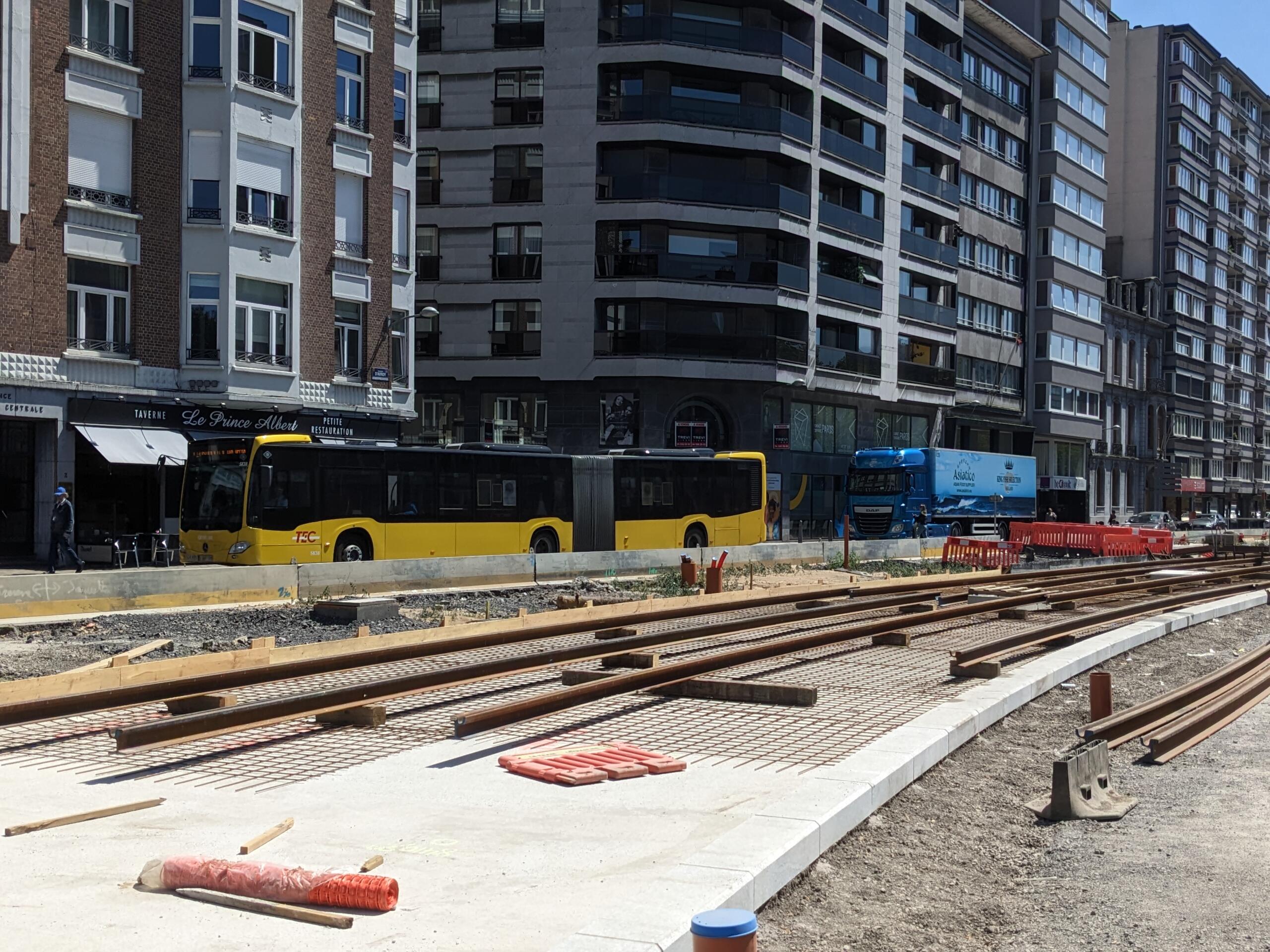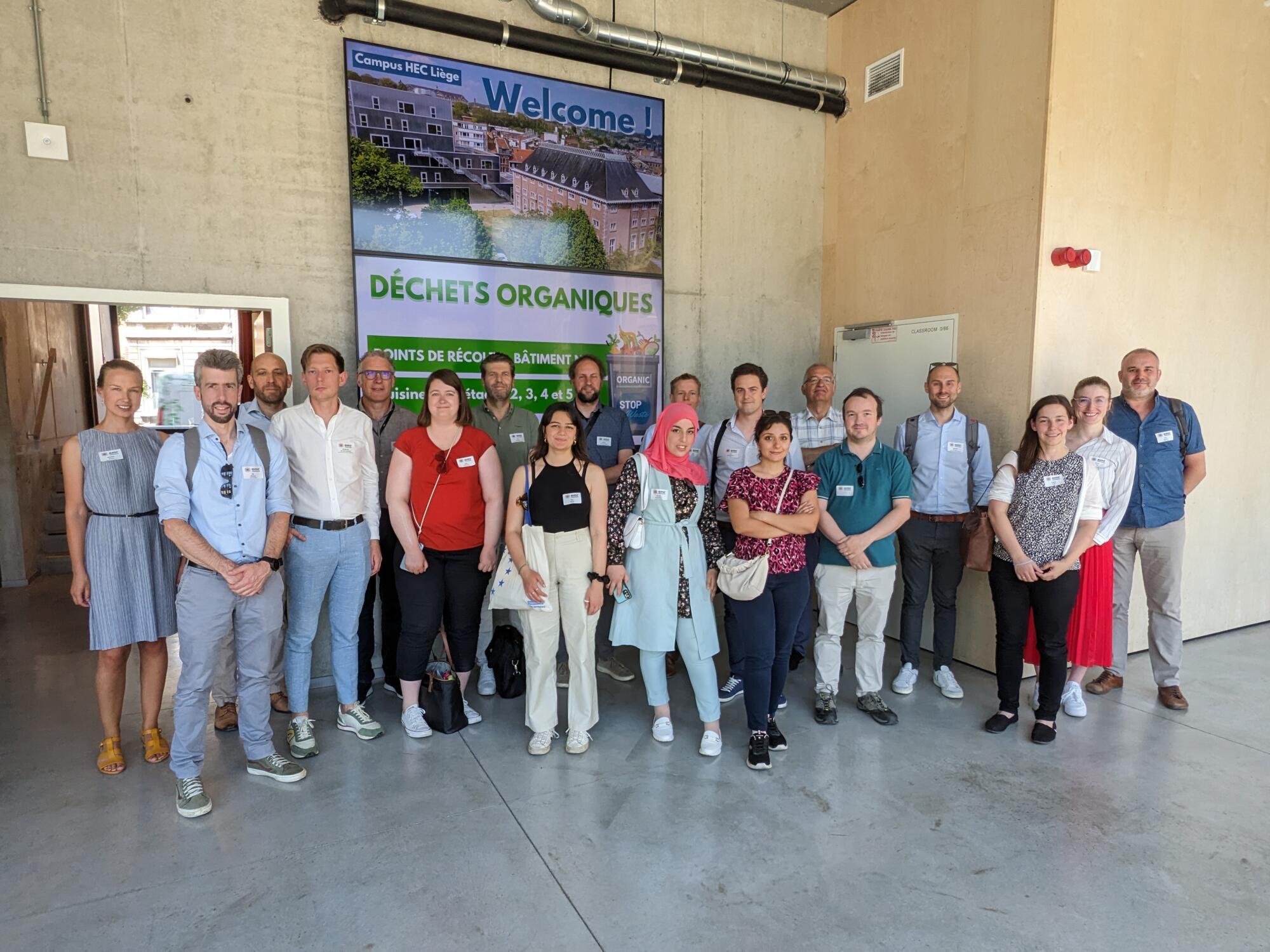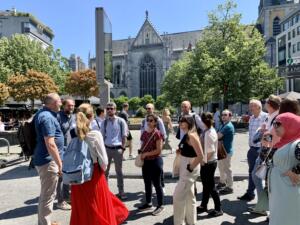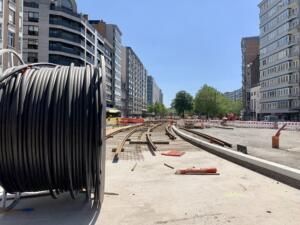Last EMR Connect workshop explores public transport in the Euregio
The fourth and last workshop of the EMR Connect series took place on 14 June 2023 in the Belgian city of Liege. More than 20 stakeholders and transport experts from the wider region met at the premises of the HEC Management School Liege for presentations about public transport solutions in the Euregio, a topic inspired by the current construction of a nearly 12 km-long city tram through Liege. The public transport works, which are stretching through the city, were visited in the afternoon and were followed by an informal get-together along the Meuse.
The hosts of the ‘Smart City Institute’ started the round of presentations by highlighting their research around city development, urbanisation, digital revolutions and smart mobility. The Institute, which was founded in 2005 and is part of the University of Liege, is bringing smart city experts and social science researchers together. One essential annual publication of the Smart City Institute has significant relevance for the City of Liege – the Wallonia Smart City Barometer. The latter assesses the technological challenges of cities and regions in Wallonia, as well as their smart governance and mobility potential.
An introduction to the mobility challenges and solutions was given by the City of Liege, which focused on the modal shift towards active mobility, the construction of the tramline, as well as the promotion of shared mobility and intermodal solutions. These plans are enshrined in two sustainable mobility plans, one for the Liege agglomeration, which is the home of 600,000 inhabitants, and a dedicated plan for the city.
Mobility Plans of Liege
Even though the city is stretching along the Meuse River and urban space is scarce, a significant amount of space is still dedicated to the car. Thus, the city aims to reduce the impact of individual motorised transport by transforming more than 400 locations into short-term parking spaces (shopping- or kiss-and-go zones) to discourage long-term parking and search traffic. These and other parking spaces are enforced by scan cars, which enhance the enforcement of parking offences by scanning number plates and matching them with the databases of parking charges. Another factor to reduce car traffic was the introduction of shared cars from ‘Poppy’ (free-floating vehicles) and ‘Cambio’ (station-based cars). Technological solutions were also a part of the plan, which includes traffic counting solutions of Telraam, which were presented during the Aachen workshop. Around 40 of these devices capture a detailed image of the traffic flows around Liege.
The new tramline of Liege
 One could speak of a revitalisation of the tram, as this mobility solution existed until the late 70s in Liege. Over the last decade, feasibility studies were conducted before the start of the construction in 2019. Prices spiked and delays happen due to the COVID-19 and Ukraine crisis, but everyone is optimistic that the construction will be finalised in 2024. Once this day will come, several trams will drive through a nearly 12 km-long track with an average speed of 19km/h to serve 23 stops and 2 Park&Ride facilities along the way. Visitors and citizens will have access to a tram each 4.5min in peak hours and every 5-10min during off-peak times.
One could speak of a revitalisation of the tram, as this mobility solution existed until the late 70s in Liege. Over the last decade, feasibility studies were conducted before the start of the construction in 2019. Prices spiked and delays happen due to the COVID-19 and Ukraine crisis, but everyone is optimistic that the construction will be finalised in 2024. Once this day will come, several trams will drive through a nearly 12 km-long track with an average speed of 19km/h to serve 23 stops and 2 Park&Ride facilities along the way. Visitors and citizens will have access to a tram each 4.5min in peak hours and every 5-10min during off-peak times.
The tram will be the centrepiece of an updated mobility for public transport, which includes the restructuring of the bus network into urban, inter-urban and fast lines. Especially the latter will allow better access to the city from the suburbs and provide a great alternative for car drivers. Therefore, the newly created bus connections will increase the modal share of public transport, which is already at 45% in Liege.
Regiotram Aachen
Similar to the other three workshops, external guests were invited to speak about public infrastructure plans, which was used by colleagues from Aachener Verkehrsverbund (transport agency of Aachen) to talk about the ‘Regiotram Aachen’, a regional train which will connect the periphery with the city of Aachen by reutilising existing railway lines. In case this 21km-long connection will get the green light from the political decision-makers in September 2023, it will go through several phases of planning, public dialogue and construction. The estimated start will be the early- to mid-2030s. Once the tramline opens, it will need less than 49min for the full distance of 21km. The information about the German consultation- and approval processes started an exchange about the different national frameworks in the three EMR countries.
Drielandentrein
Another significant public transport investment is the “Drielandentrein” (three-countries-train), which will be operated by Arriva, a daughter company of Deutsche Bahn, and will start in December. The regional train will connect Aachen with Liege, via Heerlen and Maastricht. Even though separate connections between Liege and Maastricht, as well as Maastricht and Aachen already exist, the consolidation of the entire length of around 80km is quite difficult. Several different parameters, such as voltage, ticketing, subscriptions, concessions, payment methods and other challenges need to be solved before the start.
Parking solutions & benches
In case the car will remain your favourite mode of transport despite all these highlighted solutions, several innovations to reduce the environmental impact were presented. For example, blue sitting benches indicate a request for hitchhiking. This system of around 30 ‘Mitfahrbänke’ (ride-sharing benches) was established in Ostbelgien, the German-speaking area in the East of Belgium. This low-cost and low-tech solution allows everyone to catch a ride if car drivers are interested in sharing a ride with a stranger.
In case you prefer to drive yourself and need to find a parking space, Q-park has several innovative solutions up its sleeve. As one of the leading parking providers in Western Europe, Q-Park offers more than 650.000 parking spaces and nearly 3000 charging stations to its customers. Thanks to digital innovations like Q-park accounts and dedicated apps, which will allow you to pay directly with ANPR number plate recognition, car drivers have a smoother parking experience. Furthermore, the cooperation between Q-park and various points of interest, such as concert venues and hotels, allows the concentration of parking spaces in dedicated off-street parking areas and avoids the need for dedicated parking areas for each venue. Other cooperation was established with the previously mentioned car-sharing services of Cambio and Poppy, which allows for dedicated shared mobility spots in car parks in various urban environments.
In case you have missed the other workshops, we invite you to read the summaries from Aachen, Hasselt and Heerlen.


